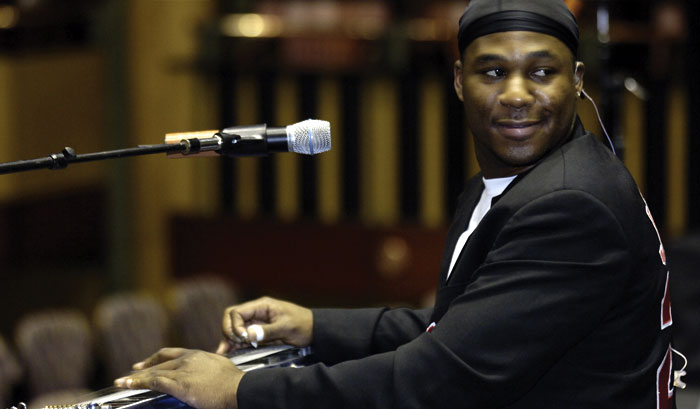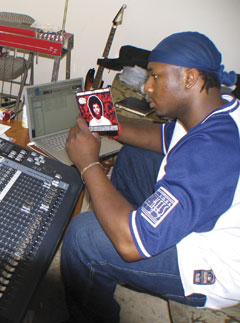


Thanks to Robert Randolph, one of the best-kept secrets in American music is a secret no more.
The young bandleader is a practitioner of a soulful and idiosyncratic style of pedal-steel guitar playing with roots not in Nashville country, but black gospel music.
"THE STYLE'S BEEN AROUND A LONG TIME," SAYS Randolph, taking a break from a soundcheck in Council Bluff, Iowa. "It's all based around the idea of the pedal steel being the main instrument of the church. In country, the pedal steel is more of a backup instrument. In our church, the pedal steel is out front driving the music. It's like the lead vocal in the band."
The 02R96 is just a great console. It's not like some of these digital boards where you need lots of onboard gear to make it sound good.
The style has flourished within the House of God, a denomination that originated in Florida and spread throughout the eastern US. Few outside the church knew of the tradition until the folk label Arhoolie began issuing a string of revelatory compilation CDs in the '90s. Suddenly, savvy roots music fans were marveling at the musicianship of such players as Calvin Cooke, the Campbell Brothers and Willie Eason.
But Robert Randolph and his group, the Family Band, are different. "We're definitely the first people to go mainstream/Top 40 with it," says Randolph. "We decided we had to put it out there, put it in clubs, take it to the masses."

Randolph adds classic rock influences to the mix, citing Stevie Ray Vaughan, Jimmy Page and Eric Clapton as key influences. "I listen to what they do," explains Robert, "then try to come up with my own version on pedal steel." The resulting gospel/blues-rock/jam-band style has clicked with secular audiences.
Young Robert started out playing drums in a House of God church in Orange, New Jersey. "Then I got interested in getting out there and expressing myself on pedal steel," he recalls. "Some close friends of the family played, like Calvin Cooke and Ted Beard. They were my main teachers and inspirations. I'd stay with them in the summer and they'd teach me."
Randolph's first taste of mainstream acclaim came when he teamed up with Medeski, Martin & Wood keyboardist John Medeski to create the gospel/blues album The Word. He followed up with Live at the Wetlands, the debut Family Band disc, and 2003's Unclassified. Since then, he's been expanding his audiences and winning such admirers as Ozzy Osbourne, Rob Thomas and Ringo Starr, all of whom recruited Robert to play on their latest releases.
Now Randolph's group is preparing their next disc between stretches on the road, working in Nashville and at Dave Matthews' Haunted Hollow Studio in Charlottesville, Virginia. "It'll have a similar vibe to the last record," says Robert. "Very rock-and-roll. Kind of sexy-like. We're still in the writing stage, figuring out which songs to include."
As he bounces from studio to tour to studio, Robert's constant recording companion is a Yamaha O2R96 mixing board. "We've been using it in all sorts of different situations," he says. "We took it to Nashville with us, then to Haunted Hollow. I've also set it up at my house for making demos. And now we're carrying it on tour so we can work on stuff on the road. It's small enough to set up in the back lounge of the bus."
And it's not just a matter of portability. "The O2R96 is just a great console," says Robert. "It's not like some of these digital boards where you need lots of outboard gear to make it sound good. The effects in the console work and sound great, and they're real easy to use. The preamps are nice and warm. It's not one of these big, complicated boards where you have to work real hard to get the sound you want--everything's userfriendly."
For Randolph, there's not much difference between a great live show and a great recording. "We record as live as possible," he says. "We all set up in the same room together and respond to each other, just like we would at a show. We might fix some things or add some overdubs later, but the basic idea is to play live and feed off each other's vibe. The core of the song happens with everyone in the room."
Robert continually works to expand his sound. "I'm always exploring different types of music," he says. "Listening to lots of jazz and rock and learning from playing on other people's records. I'm not trying to stay inside any boundaries. I'd like to do hip-hop and R&B. I even got to play metal with Ozzie. I want to expand, not make just one sort of music."
























